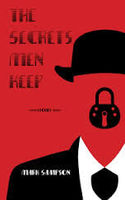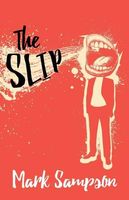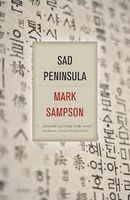Mansplaining / Hydroplaning
By Koom Kankesan
Mark Sampson does not have luxuriant locks of hair like his Biblical namesake, but Sampson does have the strength of twenty... writers. He is an avid writer of fiction and employs a rigorous practice. Each morning, he wakes up early and jumps into his writing chair to tackle his projects for a couple of hours before work. He is cheerful about this - Mark writes in the way that you and I make toast, i.e. it is part of his morning routine. Writer's Block has nightmares about him. I first encountered his writing when I read The Secrets Men Keep. I devoured this collection of stories in a couple of days. The secret of course is that there is no great secret: Mark's protagonists, like most of us, are bags of emotion and sensitivity, trying to figure out their identities, using the few confusing markers life throws our way.
I then read Mark's novel, Sad Peninsula. Though it also features a male protagonist, and utilizes some of Mark's own experience as a transplanted Maritimer teaching English in Korea, the book deals with the heavy (and hidden) legacy of comfort women. Mark himself is very affable and agreeable, devoted to his writing lifestyle. As you enter his abode, he is quick with hospitality and bonhomie - one of his signature cocktail concoctions will be quickly slipped into your hand. I think of him as the latest in a line of classically styled male writers, among the likes of Anthony Burgess and John Updike. I imagine him surrounded by wood and leather, a scotch in one hand, sheaf of manuscript pages in the other. He also just happens to be married to Rebecca Rosenblum, the subject of yesterday's post!
Koom: The first writing I read of yours was the collection The Secrets Men Keep. I tore through the book not only because it was quite readable, but because it dealt with men who weren't typical 'men's men.' Your characters were trying to negotiate their identities in relation to women and the various relationships and obligations that had to be contended with. I felt I could relate. Your new book The Slip seems to at least have some crossover in terms of this theme. Can you tell us more about the new book?
Mark: Thanks for your kind words about The Secrets Men Keep. Yes, I think many of the stories in that collection present a certain kind of contemporary man having to negotiate his identity with the various relationships and obligations in his life. I’m fascinated by the schism that can often exist between our inner sense of self and our outward projection of that self to the world. There is a lot of conflict that can arise from that disconnection, and it’s a theme that regularly crops up in my fiction.
And yes, The Slip definitely carries on with this same idea. The novel is about a pompous and self-absorbed philosophy professor, named Philip, whose life spirals out of control after he makes some extremely off-colour remarks to a female rival during a televised debate. He becomes the centre of a social media firestorm that threatens, among other things, his marriage to his much younger, feminist-minded stay-at-home wife, Grace.
A lot of the novel is about the concessions, compromises and precarious balances that Philip and Grace silently agreed to in order to make their unlikely relationship work. But as the public fervor over Philip’s “slip” swells and consumes their life, they learn pretty fast just how shaky the ground they stand on is. The novel plays this breakdown comically, but I think there is also something serious brewing beneath the surface.
Your CanLit News
Subscribe to Open Book’s newsletter to get local book events, literary content, writing tips, and more in your inbox
Koom: That sounds interesting. Reminds me a little bit of Coetzee's Disgrace although Coetzee does not have much in the way of comedy in his novel. What do you think of the recent election that saw Donald Trump become the new president? Is writing about male anxiety affected by this dramatic political development? Have things changed in the new era of Trump?
Mark: Naturally, I was horrified by the election of Donald Trump in the US – as any decent, broad-minded and conscientious person should be. I think it’s too early to say how much this will affect my fiction, partly because it’s too early to tell just what impact it will have on the States and the world more generally. It could mark the dawn of a dark new era, or it could be a brief, brutal convulsion, a shock to the political system there, like a nerve tonic. Nobody can know for sure yet. I will say this, though. There is one parallel between Philip, the protagonist of my new novel, The Slip, and Donald Trump: they both possess the most spectacularly hideous and grotesquely eye-catching comb-overs imaginable. Through the writing of this book, I came to realize what a wonderful metaphor the comb-over can be for male obliviousness and pomposity, a totem to symbolize a lack of self-awareness.
Koom: Ha ha, that's pretty good. I think you're striking new territory by using the comb-over as a Freudian symbol! I'm going to change direction a little bit. You're married to the writer Rebecca Rosenblum. You're both devoted writers who are very serious about your work. How does being married to a (female) writer affect the way you process your writing and creative life? Do you think it has any impact on your treatment of the male condition?
Mark: Yes, let it be known far and wide that I have given the comb-over a long-overdue and much-deserved place in the agora of literary symbolism. As for my marriage to RR, what can I say? It’s pretty great to have hot- and cold-running brilliance living under the same ceiling as me. She brings a lot of talent and storytelling know-how to bear on early drafts of work that I show her, and I hope I do the same for her. Regardless of whatever subject matter preoccupies me at any given time, I feel she always has a unique perspective that helps illuminate the text in a way I hadn’t thought of. She and I spend a lot of time talking about our respective projects, but we also spend time just talking about writing in general, about what works and what doesn’t for us, and how to get better with each new project. It’s like a mini creative writing seminar that creeps in around discussions about what to have for dinner or whose turn is it to scoop the kitty litters.
Koom: Cool. I did not mean to swing the interview into an endorsement for RR! I will end with this question though. You told me once that you and RR have achieved a kind of ideal state of sympatico in terms of your writing schedules and processes. Is there anything else you want to say about a) the writing process, b) living with another literary writer, or c) anything else at all...
Mark: I often find it a challenge to say anything unique or interesting about the so-called “writing process,” partly because better writers than me have expended reams of paper describing it in far more detail than I ever could (or would be willing to), and partly because it’s not something I’m particularly interested in fetishizing or romanticizing too much. I get up early five days a week to write for a few hours, and I try to squeeze in a few additional hours on the weekend when I can. I map things out in advance with character sketches and outlines, but not too much. I write the best first draft I can, with varied success. Then I revise and edit and proofread the thing to death – usually four or five drafts’ worth, at a minimum – trying to get things right, or at least better. After that, I’ll share it with Rebecca or some friends, and then do another draft (or four) based on their critiques. Then I’ll try to sell the thing, and take in more feedback from the editor, if it comes. None of this is terribly glamorous or original, but it works for me. The hope, the faith, day after day after day at the writing desk, is that it will continue to do so.
The views expressed in the Writer-in-Residence blogs are those held by the authors and do not necessarily reflect the views of Open Book.
Koom Kankesan was born in Sri Lanka. While his family lived abroad, the civil war in Sri Lanka broke out and this caused them to seek a new home. They eventually settled in Canada and have lived here since the late eighties. He has a background in English Literature and Film Studies. Koom contributed arts journalism to various publications before becoming a high school teacher in the Toronto District School Board. Since working as a teacher, he has taken semesters off now and again to work on his fiction. The Tamil Dream, his new book, is his most ambitious to date. It looks at the end of the civil war in Sri Lanka and how it affected Tamils here in Canada. Besides literature and film, Koom has deep interests in history and science, and an enduring love for comic books.
You can write to Koom throughout January at writer@open-book.ca.




